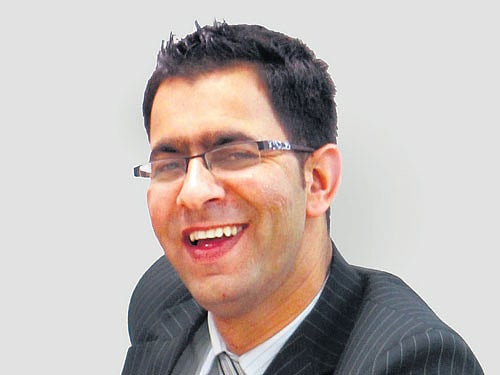He belongs to a place in Kashmir which has seen the highest fatalities and destruction during the 25 years of insurgency. When AK-47 was only fascination of his peer group in 1990s, his only dream was to achieve something through which he could serve his community.
Born and brought up in a remote area of north Kashmir’s Kupwara district, Peer G N Suhail’s journey from a village boy, who spent his childhood amid bullets, bombs and fear, to an internationally recognised development policy analyst is unique.
Suhail’s initial schooling started when armed insurgency was at its peak in Kashmir and Kupwara was its epicentre. “As an ordinary student from a lower middle class family, I was fortunate to have some economic support to pursue my education, unlike many of my friends in the village who earned a living by
grazing cattle. Those days schools would remain closed most of the time because of frequent strike call given by separatists or militant outfits which hampered the smooth functioning of teaching and kept me away from the crucial basic regular formal schooling,” 33-year-old Suhail told Deccan Herald.
He managed to clear 12th standard and, breaking the traditional shackles, decided to pursue social sciences. But for taking admission to undergraduate course he had to shift to Srinagar further increasing the burden on his parents.
“After shifting from countryside to an urban area, it was a new experience and a new way of living for me. It helped me to interact with people from diverse backgrounds and I joined a local NGO in
Srinagar, where students from all walks of life would meet, interact and discuss their ideas openly which was impossible in my village,” Suhail said.
After graduation, he got a job in an international NGO working in Kashmir in 2006. “I learned and updated my skills in core project management domains like design, monitoring and evaluation of projects/programmes, strategies for development, negotiation and conflict resolution skills and a number of other things which are very useful in managerial level and programme implementation level as well,” he said.
However, the major breakthrough in Suhail’s career came in 2008 when he got a prestigious fellowship to study master’s in International Development at Tsinghua University in Beijing, China.
After completing his masters, he got another fellowship to pursue PhD in management sciences at China Agricultural University.
After his doctorate, Suhail had several lucrative offers to work in China and the US. However, rejecting the comforts of a job abroad, he chose to come back to serve his community in Kashmir. “It was a tough call to come back to Kashmir. But I had left the Valley to learn and return to help my society. There are thousands of professionals who love to work in cosy
environment of the US, China and developed countries. But you would hardly find someone interested in working in the conflict-hit small region of Kashmir. And we can’t expect outsiders to come and work here,” he said. He made a choice to share the knowledge with fellow scholars in Kashmir and contribute his experience and academic training.
“I spent six years in China and had an opportunity to attend lectures, interact and discuss with the leading scholars of the world. I want to use my skills, academic training and the culture of research from China, and replicate them here. If we could do that I am sure, we will put ourselves on the research map of the world, where we do not exist,” he says.
After his return, Suhail established Centre for Research and Development Policy (CRDP), a non-profit research, training, and development policy organisation. Over the last couple of years, the CRDP has been carrying out research on land and water politics, India and
Pakistan peace process, cross-border trade, youth related issues in the Valley.
The centre also runs Kashmir’s first of its kind fortnightly lecture and discussion series “Kehwa Talk.” “Our objective is to conduct surveys and evaluate state and non-state development programmes/projects, such as Mnrega, NRHM, agricultural schemes, educational policy programmes and other initiatives led by non-government organisations,” Suhail said.
Besides, he says, to conduct training and skill development programmes for educated unemployed youth, widows and semi-skilled labour force and to do advocacy for girl education and gender rights would be CRDP’s priority areas.
The CRDP intends to establish resource centres, libraries for independent research scholars and providing research grants and fellowships to meritorious students. “To provide career counselling and training sessions to school, college and university students and offering trainings in management, ethical leadership building, negotiation and conflict management, peace building to government and non-government agencies and private sector employees will be the focus of CRDP,” Suhail added.
The CRDP recently compiled its first comprehensive report on September 2014 Kashmir floods which has recommended an investigation into why the administration could not do much to inform people in advance. This comprehensive document “was compiled after considering the viewpoints of all stakeholders and submitted to the J&K relief and rehabilitation minister. The document can guide the government in handling future disasters,” Suhail said.
The CRDP also recommended to the state government to evolve and implement disaster policy to avert 2014 flood-like situation in future.

